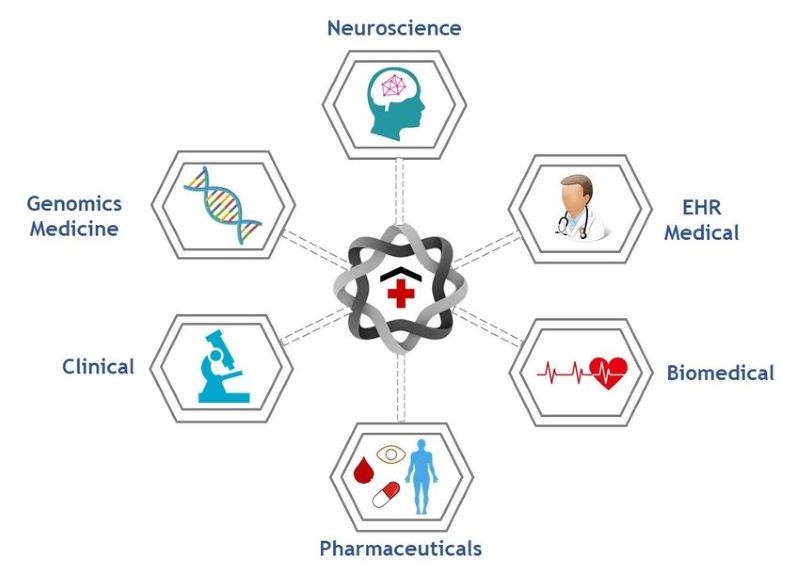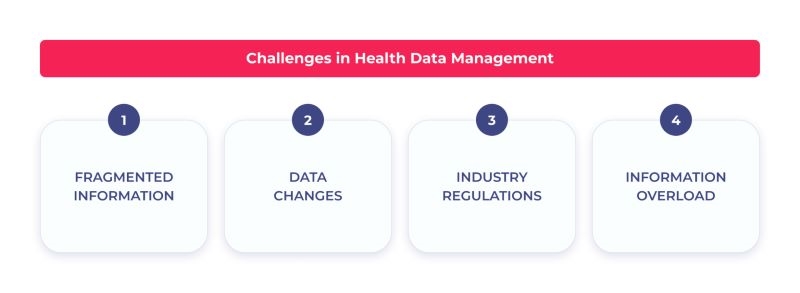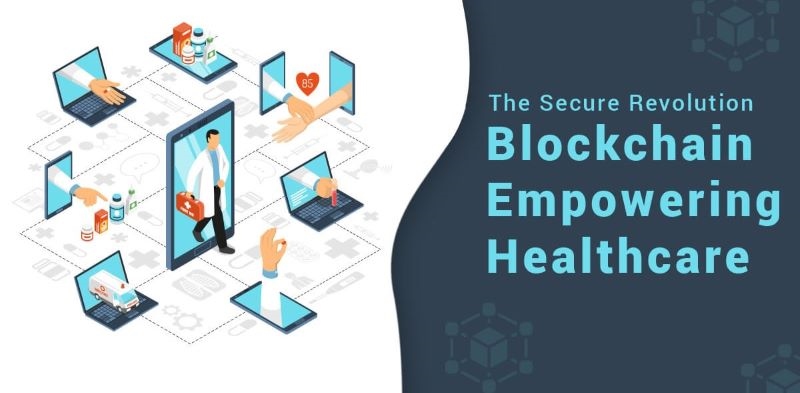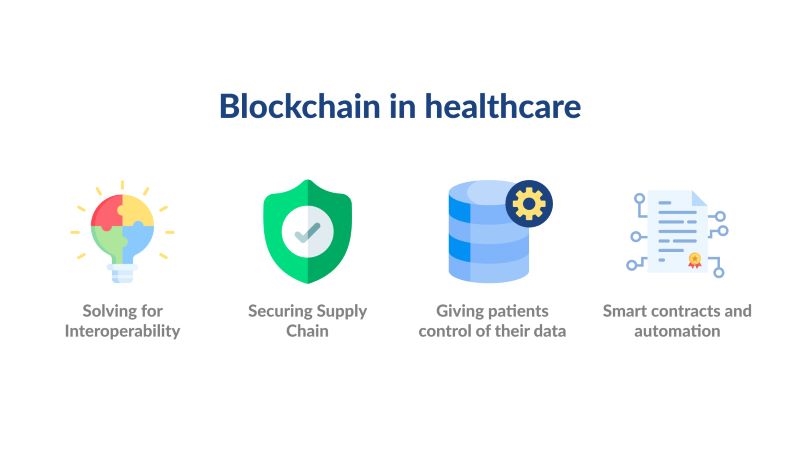Categories: Blockchain
Challenges and Opportunities of Blockchain in Healthcare: Towards a Patient-Centered Future
Blockchain in healthcare enhances data security, interoperability, and transparency. It allows secure sharing of patient records, streamlines supply chain management, and improves clinical trials' efficiency, leading to better patient outcomes and cost savings.
Join us as we delve into the immense potential of blockchain in healthcare, exploring real-world applications already underway and the challenges that lie ahead in realizing this promising future.
Table of Contents
Benefits of Blockchain in Healthcare
Electronic Health Records (EHR) Management
Enhanced Security and Privacy: Blockchain's inherent immutability and decentralization create a fortress for patient data, protecting it from unauthorized access and tampering. This ensures the confidentiality and integrity of sensitive medical information.
Improved Transparency and Traceability: With blockchain, every modification to a medical record is meticulously tracked, ensuring transparency and accountability. This clear audit trail enhances trust between patients, healthcare providers, and other stakeholders.

Seamless Data Sharing: Blockchain facilitates secure and efficient data exchange between healthcare providers, promoting seamless care coordination. This real-time access to comprehensive patient information empowers medical professionals to make informed decisions, leading to better patient outcomes.
Supply Chain Management
Counterfeit Drug Prevention: By tracking the origin and movement of drugs on the blockchain, the risk of counterfeit medications entering the supply chain is significantly reduced. This ensures the authenticity and safety of pharmaceuticals.
Supply Chain Transparency: Blockchain provides a transparent record of the entire drug journey, from manufacturing to distribution. This increased visibility fosters accountability and builds trust in the pharmaceutical supply chain.
Improved Efficiency and Cost Reduction: Blockchain streamlines supply chain processes by automating tasks and reducing the need for manual intervention. This translates to reduced administrative costs and increased operational efficiency.
Clinical Trial
Data Integrity and Accuracy: Blockchain ensures the accuracy and integrity of clinical trial data, minimizing the risk of errors and fraud. This strengthens the reliability of research findings and accelerates the development of new treatments.
Patient Privacy Protection: Blockchain's decentralized nature allows for secure storage and sharing of patient data while preserving their privacy. This enables research to progress without compromising sensitive information.
Enhanced Collaboration: Blockchain facilitates seamless collaboration between researchers and institutions, breaking down data silos and accelerating the pace of medical discoveries.
Healthcare Insurance
Automated Claims Processing: Smart contracts on the blockchain automate claims processing, reducing administrative overhead and improving efficiency. This leads to faster claim settlements and a smoother experience for both patients and insurers.
Fraud Prevention: Blockchain's tamper-proof nature helps detect and prevent fraudulent insurance claims, saving costs for insurers and protecting patients from the consequences of fraud.
Increased Transparency: By providing a transparent record of insurance transactions, blockchain enhances trust and accountability within the healthcare insurance sector.
Challenges of Blockchain in Healthcare
Despite its immense potential, blockchain in healthcare faces several challenges that need to be addressed for widespread adoption and successful implementation. These challenges include:
Regulatory and Legal Issues
Existing healthcare regulations, such as HIPAA in the United States, were not designed with blockchain in mind. This creates uncertainty regarding data privacy, ownership, and liability, hindering the development and adoption of blockchain solutions. Clarifying these regulations and developing new frameworks that address the unique aspects of blockchain in healthcare is crucial for its progress.

Interoperability with Existing Systems
Integrating blockchain technology with legacy healthcare systems can be complex and costly. Many healthcare organizations still rely on outdated and disparate systems, making it challenging to seamlessly integrate blockchain solutions. Overcoming this interoperability barrier requires collaboration between technology providers, healthcare organizations, and regulatory bodies to establish standardized data formats and protocols.
Scalability
The healthcare industry generates massive amounts of data, and blockchain technology needs to be able to handle this volume efficiently. Scalability remains a challenge for many blockchain platforms, as they struggle to process a high number of transactions quickly and cost-effectively. Developing more scalable blockchain solutions is essential for widespread adoption in the healthcare sector.
Cost of Implementation
Implementing blockchain solutions can be expensive, especially for smaller healthcare organizations with limited resources. The costs associated with infrastructure, development, and maintenance can be a significant barrier to entry. Exploring cost-effective implementation strategies and open-source solutions can help make blockchain more accessible to a wider range of healthcare providers.

Education and Awareness
Healthcare professionals and patients need to be educated about the benefits and risks of blockchain technology. A lack of understanding and awareness can lead to skepticism and resistance to adoption. Building trust and confidence in blockchain requires educational initiatives, clear communication, and demonstrable use cases that showcase its potential to improve healthcare outcomes and processes.
Real-World Blockchain Projects in Healthcare
MedRec: MedRec is a decentralized platform for managing medical records, leveraging blockchain to ensure secure storage and sharing of patient data. By giving patients control over their health information and enabling seamless access for authorized healthcare providers, MedRec empowers patients to actively participate in their own care while ensuring privacy and security.
BurstIQ: BurstIQ is a healthcare data platform that utilizes blockchain technology to create a secure and interoperable data ecosystem. It enables the safe sharing, analysis, and monetization of health data while ensuring compliance with privacy regulations. BurstIQ's platform empowers individuals to take control of their health data and allows healthcare organizations to unlock the value of their data assets.
Patientory: Patientory is a blockchain-based platform that aims to revolutionize patient engagement and care coordination. By providing a secure and user-friendly interface for accessing medical records, managing appointments, and communicating with healthcare providers, Patientory empowers patients to actively participate in their own care journey. It also enables secure data sharing between healthcare providers, improving care coordination and reducing medical errors.
These projects demonstrate the tangible benefits that blockchain technology can bring to the healthcare industry. By enhancing data security, promoting interoperability, and empowering patients, they are paving the way for a more efficient, patient-centric, and innovative healthcare system.
Future Outlook of Blockchain in Healthcare
The future of blockchain in healthcare is brimming with possibilities, extending far beyond the current applications. As technology continues to evolve, we can anticipate a profound impact on various facets of healthcare, including:
Personalized Medicine: Blockchain can create secure and interoperable platforms for sharing genomic data, enabling tailored treatment plans and precision medicine approaches. This could revolutionize how diseases are diagnosed, treated, and prevented, leading to better patient outcomes and a more personalized approach to healthcare.
Genomics: Blockchain can provide a secure and transparent framework for storing and sharing genomic data, accelerating research and enabling advancements in genetic testing and personalized therapies. This could unlock new avenues for understanding and treating genetic disorders, ultimately improving the lives of millions of people.

Health Data Marketplaces: Blockchain-powered data marketplaces can empower individuals to own and control their health data, choosing to share it with researchers or healthcare providers in exchange for compensation. This could incentivize data sharing, fuel medical research, and create new economic opportunities for individuals.
Decentralized Clinical Trials: Blockchain can enhance the efficiency, transparency, and integrity of clinical trials by securely recording patient data, automating processes, and ensuring trust in research findings. This could accelerate the development of new drugs and therapies, bringing life-saving treatments to patients faster.
Supply Chain Optimization: Beyond pharmaceuticals, blockchain can be applied to optimize the supply chain of medical devices, equipment, and other essential healthcare resources. This can ensure the authenticity, traceability, and availability of critical supplies, improving patient safety and reducing costs.
Blockchain technology is opening up new horizons for the healthcare industry, promising a future centered around patients. Despite remaining challenges, the potential benefits of blockchain in enhancing security, transparency, and interoperability in managing electronic health records, supply chain management, clinical trials, health insurance, and various other areas cannot be denied.
Real-world projects such as MedRec, BurstIQ, and Patientory have demonstrated tangible benefits that blockchain brings. However, to fully realize this potential, collaboration among stakeholders in healthcare, blockchain developers, regulatory bodies, and users is crucial. Only through such collaboration can we address current challenges and build a more efficient, transparent healthcare system that puts patients at the center.
The future of blockchain in healthcare is promising. With the continuous advancement of technology, we can expect blockchain to bring breakthroughs in personalized medicine, genetic research, healthcare data markets, decentralized clinical trials, and supply chain optimization. Next-generation blockchain platforms like U2U Network, with superior scalability and low transaction costs, promise to play a significant role in advancing the development and application of blockchain in healthcare, delivering tangible benefits to patients, healthcare providers, and society as a whole.
.png)